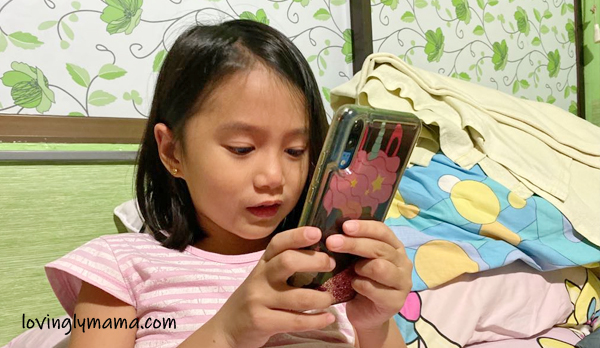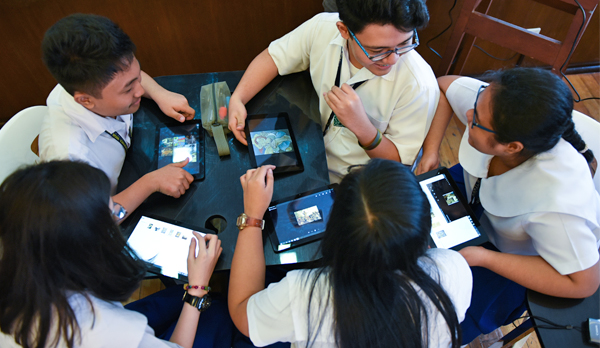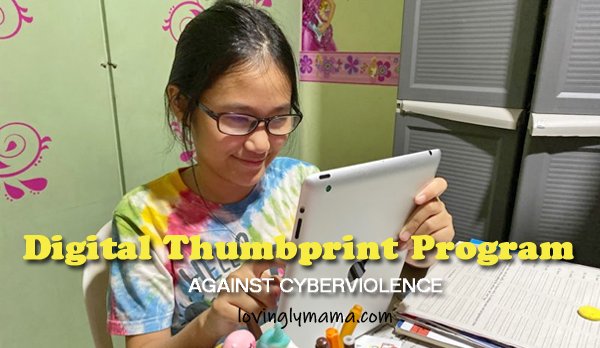More and more kids and teens are prone to depression and other disorders because of online verbal abuse. With the surge of internet and gadgets use among the young population, cybersecurity measures should be in place to protect the young. Hence, the Digital Thumbprint Program.
The Digital Thumbprint Program
As an advocate of cybersecurity and online safety, Globe Telecom is helping kids learn how to fight online verbal abuse the right way. This is through its Digital Thumbprint Program (DTP) which the Department of Education (DepEd) has adopted. Now, it is part of the Values Education subject in schools.
- Related: The Use of Tablets Among Children
What Constitutes Online Verbal Abuse?
Globe’s Yoly Crisanto pointed out that making fun of kids online can already be considered as verbal abuse. Ms. Crisanto is the Chief Sustainability Officer and SVP for Corporate Communications of Globe Telecom. She adds that online verbal abuse can include teasing, taunting, or calling them names.

“Kids are highly vulnerable online and their experiences can have a debilitating effect on their physical and psychological well-being.”
Yoly Crisanto, Chief Sustainability Officer and SVP for Corporate Communications of Globe Telecom
Children are very susceptible to online abuse. They can feel humiliated, embarrassed, and helpless with no one to turn to.
“Through DTP, we hope to teach children how to respond to online abuse. Moreover, we aim to guide them on proper online behavior. This will help shape digital behaviors in the future and prevent negative impacts of online abuse,” she said.
Safer Online Environment
The 2016 National Baseline Survey on Violence Against Children (NBS-VAC) noted that 43.8 % of Filipino children ages 13 to 18 years have experienced cyber violence. About 1/3 of these cases were in the form of verbal abuse over the internet or mobile phone. This can be through name calling, body shaming, threats, hate messages, sarcasm, and derogatory language.
Thus, to help provide a safer online environment for children, DTP is being conducted in schools to underscore digital citizenship. It helps students, teachers, and parents on how to effectively avoid becoming victims of online verbal abuse. Additionally, there are guidelines on how to tackle abuse the right way.
Digital Thumbprint Program Learning Modules
The DTP is done mainly through learning modules and workshops designed to increase students’ knowledge about digital citizenship and cybersafety. These modules involve taking a careful look at kids’ online behavior and helping them develop needed insights about the online world.

Likewise, the DTP creates a dialogue where kids are able to learn and understand how to navigate the internet safely.
Believing that every child has a right to quality education, Globe continues to strive to advanced learning and education technology across public schools. The company is enabling the youth to become responsible digital citizens.
For Homeschooling Families
Homeschooling families will find it easier to monitor their children’s online use. They are together most of the time at home. So the parent-supervisors are able to check their children if they are doing schoolwork, gaming, or interacting on social media.

Nevertheless, we would also be able to benefit from the Digital Thumbprint Program. We can do the modules at home with our children and have a dialogue with them.
- Related: Life Lessons for Girls from Frozen 2
That way, they can share about the things they have observed online and we can guide them on appropriate responses. That’s parenting in the digital age.
For More Details
For more about the Digital Thumbprint Program, please visit the website. Click here: https://www.globe.com.ph/about-us/sustainability/digital-nation/digital-thumbprint.html


This is a very nice initiative from Globe. I agree that kids need guidance in using the internet productively and how to handle the negativity on social media. There are a lot of online predators lurking in the internet so we need to be vigilant and monitor our kids’ internet usage.